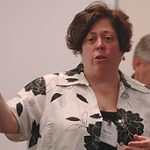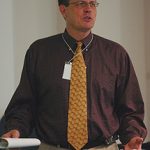Administrators from three Associated New American Colleges (ANAC) institutions shared their programs Friday, June 15 to engage first-year students in their studies and activities, improving their chance for academic success. Details...
The session, titled “Engaging Students in Their Successes,” was part of the ANAC Summer Institute at Elon. David Milford, dean of campus life at The Sage Colleges at Troy, NY, moderated the session. He said Sage realized it needed to be more intentional in its work with first-year students while reviewing data from the National Survey of Student Engagement (NSSE).
“It was interesting to us that when we looked at our NSSE data, we asked our students did you engage in your first-year experience, and they said no,” Milford said. “It was because we didn’t call it a first-year experience.”
 Sharon Robinson, academic dean at Sage, described the college’s efforts to work closely with new students. All first-year students are in the same place at the same time at least 3 times a week for a variety of academic, life-skills and social programming. On Wednesdays, first-year students are required to keep the lunch hour open for forums with common reading authors and other speakers. Town meetings, organized and run by students to discuss any topic of interest, are held every Friday. First-year students also take part in the CIC New York Times readership program, which supplies the newspaper to students free of charge.
Sharon Robinson, academic dean at Sage, described the college’s efforts to work closely with new students. All first-year students are in the same place at the same time at least 3 times a week for a variety of academic, life-skills and social programming. On Wednesdays, first-year students are required to keep the lunch hour open for forums with common reading authors and other speakers. Town meetings, organized and run by students to discuss any topic of interest, are held every Friday. First-year students also take part in the CIC New York Times readership program, which supplies the newspaper to students free of charge.
“It’s a great thing to see students talking about (the newspaper) outside of class,” Robinson said. “It has really changed the campus culture.”
Sage also revamped its orientation program for first-year students, Milford said.
“We realized that mid-summer orientation was largely forgotten by September. Now, we bring them in for a half-day in June and then have an extended orientation in the fall,” Milford said. The orientation also includes a common reading, and students are expected to write a reaction paper and bring it with them at the start of school.
Implementing a student success seminar has been similarly successful at Wagner College, said Anne Love, dean of academic and career development. Students on academic probation take part in the seminars, examining why they are in college and discussing the various problems that may have landed them on probation. Love said the program has helped students improve their academic performance.
“Information does not equal transformation,” said Love. “We realized we needed to develop the relationship with the students.”
 Rex Waters, associate dean of students at Elon, talked about helping students build successful teams. It’s not enough to simply put students in groups and expect them to succeed, Waters said. They must also learn about team dynamics and how to work together.
Rex Waters, associate dean of students at Elon, talked about helping students build successful teams. It’s not enough to simply put students in groups and expect them to succeed, Waters said. They must also learn about team dynamics and how to work together.
“I try to minimize the unknown,” Waters said. “We get all the information out on the table right away.”
Waters pointed out that working with student groups poses a special challenge.
“It’s hard for groups to be successful when because of constant attrition,” Waters said. “Imagine trying to be successful when you lose 25 percent of your members every year and only work for 6 or 7 months out of the year.”


